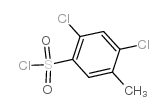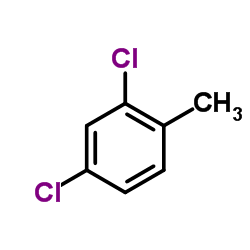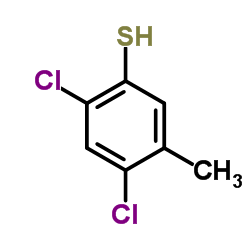28286-86-4
| 中文名 | 2,4-二氯-5-甲基氟苯磺酰氯 |
|---|---|
| 英文名 | 2,4-dichloro-5-methylbenzenesulfonyl chloride |
| 中文别名 | 2,4-二氯-5-甲基苯磺酰氯 |
| 英文别名 |
F1967-0681
MFCD00044016 2,4,5-TRIAMINO-6-CHLORO PYRIMIDNE EINECS 248-938-1 2,4-Dichloro-5-methylbenzenesulfonyl chloride 2,4-dichloro-5-methylbenzene-1-sulfonyl chloride 2,4-dichloro-5-methylbenzene sulfonylchloride 4,6-Dichlor-toluol-3-sulfonylchlorid 2,4-dichloro-5-methylphenylsulfonyl chloride 4,6-dichloro-toluene-3-sulfonyl chloride |
| 密度 | 1.56g/cm3 |
|---|---|
| 沸点 | 333.2ºC at 760mmHg |
| 熔点 | 67-72 °C |
| 分子式 | C7H5Cl3O2S |
| 分子量 | 259.53700 |
| 闪点 | 155.3ºC |
| 精确质量 | 257.90800 |
| PSA | 42.52000 |
| LogP | 4.31010 |
| 蒸汽压 | 0.000268mmHg at 25°C |
| 折射率 | 1.571 |
| 储存条件 | 保持贮藏器密封、储存在阴凉、干燥的地方,确保工作间有良好的通风或排气装置 |
| 稳定性 | 如果遵照规格使用和储存则不会分解,未有已知危险反应 避免氧化物 |
| 计算化学 | 1.疏水参数计算参考值(XlogP):3.6 2.氢键供体数量:0 3.氢键受体数量:2 4.可旋转化学键数量:1 5.互变异构体数量:无 6.拓扑分子极性表面积42.5 7.重原子数量:13 8.表面电荷:0 9.复杂度:272 10.同位素原子数量:0 11.确定原子立构中心数量:0 12.不确定原子立构中心数量:0 13.确定化学键立构中心数量:0 14.不确定化学键立构中心数量:0 15.共价键单元数量:1 |
| 更多 | 1. 性状:带白色的晶体状粉末 2. 密度(g/mL,25℃):未确定 3. 相对蒸汽密度(g/mL,空气=1):未确定 4. 熔点(ºC):70-73 5. 沸点(ºC,常压):未确定 6. 沸点(ºC, KPa):未确定 7. 折射率:未确定 8. 闪点(ºC):未确定 9. 比旋光度(º):未确定 10. 自燃点或引燃温度(ºC):未确定 11. 蒸气压(Pa,23ºC):未确定 12. 饱和蒸气压(KPa,20ºC):未确定 13. 燃烧热(KJ/mol):未确定 14. 临界温度(ºC):未确定 15. 临界压力(KPa):未确定 16. 油水(辛醇/水)分配系数的对数值:未确定 17. 爆炸上限(%,V/V):未确定 18. 爆炸下限(%,V/V):未确定 19. 溶解性:可溶于水 |
Synonym:m-Toluenesulfonyl chloride, 4,6-dichloro-; 2,4-Dichlorotoluene-5-sulfochloride Section 2 - COMPOSITION, INFORMATION ON INGREDIENTS
Risk Phrases: 34 Section 3 - HAZARDS IDENTIFICATION EMERGENCY OVERVIEW
Causes burns.Moisture sensitive. Potential Health Effects Eye: Causes eye burns. Skin: Causes skin burns. Ingestion: Causes gastrointestinal tract burns. Inhalation: Causes chemical burns to the respiratory tract. Chronic: Chronic exposure may cause effects similar to those of acute exposure. Section 4 - FIRST AID MEASURES Eyes: In case of contact, immediately flush eyes with plenty of water for at least 15 minutes. Get medical aid immediately. Skin: In case of contact, immediately flush skin with plenty of water for at least 15 minutes while removing contaminated clothing and shoes. Get medical aid immediately. Wash clothing before reuse. Ingestion: If swallowed, do NOT induce vomiting. Get medical aid immediately. If victim is fully conscious, give a cupful of water. Never give anything by mouth to an unconscious person. Inhalation: If inhaled, remove to fresh air. If not breathing, give artificial respiration. If breathing is difficult, give oxygen. Get medical aid. Notes to Physician: Treat symptomatically and supportively. Section 5 - FIRE FIGHTING MEASURES General Information: As in any fire, wear a self-contained breathing apparatus in pressure-demand, MSHA/NIOSH (approved or equivalent), and full protective gear. During a fire, irritating and highly toxic gases may be generated by thermal decomposition or combustion. Extinguishing Media: Use water spray, dry chemical, carbon dioxide, or chemical foam. Section 6 - ACCIDENTAL RELEASE MEASURES General Information: Use proper personal protective equipment as indicated in Section 8. Spills/Leaks: Vacuum or sweep up material and place into a suitable disposal container. Clean up spills immediately, observing precautions in the Protective Equipment section. Avoid generating dusty conditions. Provide ventilation. Do not get water inside containers. Section 7 - HANDLING and STORAGE Handling: Minimize dust generation and accumulation. Do not breathe dust, vapor, mist, or gas. Do not get in eyes, on skin, or on clothing. Keep container tightly closed. Do not ingest or inhale. Do not allow contact with water. Use only in a chemical fume hood. Discard contaminated shoes. Keep from contact with moist air and steam. Storage: Store in a cool, dry place. Store in a tightly closed container. Corrosives area. Store protected from moisture. Section 8 - EXPOSURE CONTROLS, PERSONAL PROTECTION Engineering Controls: Facilities storing or utilizing this material should be equipped with an eyewash facility and a safety shower. Use adequate ventilation to keep airborne concentrations low. Exposure Limits CAS# 28286-86-4: Personal Protective Equipment Eyes: Wear chemical splash goggles. Skin: Wear appropriate protective gloves to prevent skin exposure. Clothing: Wear appropriate protective clothing to prevent skin exposure. Respirators: Follow the OSHA respirator regulations found in 29 CFR 1910.134 or European Standard EN 149. Use a NIOSH/MSHA or European Standard EN 149 approved respirator if exposure limits are exceeded or if irritation or other symptoms are experienced. Section 9 - PHYSICAL AND CHEMICAL PROPERTIES Physical State: Crystalline powder Color: off-white Odor: Not available. pH: Not available. Vapor Pressure: Not available. Viscosity: Not available. Boiling Point: Not available. Freezing/Melting Point: 67-72 deg C Autoignition Temperature: Not available. Flash Point: Not applicable. Explosion Limits, lower: Not available. Explosion Limits, upper: Not available. Decomposition Temperature: Solubility in water: Specific Gravity/Density: Molecular Formula: C7H5Cl3O2S Molecular Weight: 259.54 Section 10 - STABILITY AND REACTIVITY Chemical Stability: Moisture sensitive. Material hydrolyzes in contact with moisture/water releasing toxic and corrosive fumes of hydrogen chloride and aqueous hydrochloric acid. Conditions to Avoid: Dust generation, exposure to moist air or water. Incompatibilities with Other Materials: Strong oxidizing agents, strong bases. Hazardous Decomposition Products: Hydrogen chloride, carbon monoxide, oxides of sulfur, carbon dioxide. Hazardous Polymerization: Has not been reported Section 11 - TOXICOLOGICAL INFORMATION RTECS#: CAS# 28286-86-4 unlisted. LD50/LC50: Not available. Carcinogenicity: 2,4-Dichloro-5-methylbenzenesulfonyl chloride - Not listed by ACGIH, IARC, or NTP. Section 12 - ECOLOGICAL INFORMATION Section 13 - DISPOSAL CONSIDERATIONS Dispose of in a manner consistent with federal, state, and local regulations. Section 14 - TRANSPORT INFORMATION IATA Shipping Name: CORROSIVE SOLID, ACIDIC, ORGANIC, N.O.S. Hazard Class: 8 UN Number: 3261 Packing Group: III IMO Shipping Name: CORROSIVE SOLID, ACIDIC, ORGANIC, N.O.S. Hazard Class: 8 UN Number: 3261 Packing Group: III RID/ADR Shipping Name: CORROSIVE SOLID, ACIDIC, ORGANIC, N.O.S. Hazard Class: 8 UN Number: 3261 Packing group: III Section 15 - REGULATORY INFORMATION European/International Regulations European Labeling in Accordance with EC Directives Hazard Symbols: C Risk Phrases: R 34 Causes burns. Safety Phrases: S 26 In case of contact with eyes, rinse immediately with plenty of water and seek medical advice. S 36/37/39 Wear suitable protective clothing, gloves and eye/face protection. S 45 In case of accident or if you feel unwell, seek medical advice immediately (show the label where possible). WGK (Water Danger/Protection) CAS# 28286-86-4: No information available. Canada None of the chemicals in this product are listed on the DSL/NDSL list. CAS# 28286-86-4 is not listed on Canada's Ingredient Disclosure List. US FEDERAL TSCA CAS# 28286-86-4 is not listed on the TSCA inventory. It is for research and development use only. SECTION 16 - ADDITIONAL INFORMATION N/A |
|
生态学数据: 通常对水是稍微有危害的,若无政府许可,勿将材料排入周围环境。
|
| 危害码 (欧洲) | C:Corrosive; |
|---|---|
| 风险声明 (欧洲) | R34 |
| 安全声明 (欧洲) | S45-S36/37/39-S26 |
| 危险品运输编码 | 1760 |
| 包装等级 | II |
| 危险类别 | 8 |
| 海关编码 | 2904909090 |
|
~77% 
28286-86-4 |
| 文献:Delfin, Dawn A.; Morgan, Rachel E.; Zhu, Xiaohua; Werbovetz, Karl A. Bioorganic and Medicinal Chemistry, 2009 , vol. 17, # 2 p. 820 - 829 |
| 上游产品 1 | |
|---|---|
| 下游产品 2 | |
| 海关编码 | 2904909090 |
|---|---|
| 中文概述 | 2904909090 其他烃的磺化、硝化、亚硝化衍生物(不论是否卤化). 增值税率:17.0% 退税率:9.0% 监管条件:无 最惠国关税:5.5% 普通关税:30.0% |
| 申报要素 | 品名, 成分含量, 用途 |
| Summary | HS:2904909090 sulphonated, nitrated or nitrosated derivatives of hydrocarbons, whether or not halogenated VAT:17.0% Tax rebate rate:9.0% Supervision conditions:none MFN tariff:5.5% General tariff:30.0% |




![1,5-dichloro-2-[(2,4-dichloro-5-methylphenyl)disulfanyl]-4-methylbenzene结构式](https://image.chemsrc.com/caspic/127/88519-69-1.png)